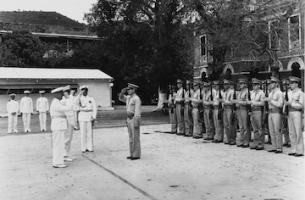The celebration of Columbus is a product of over five centuries of colonialism and capitalist development.
“The capitalist and imperialist systems that Columbus helped birth were met with fierce resistance from Indigenous people, African people, and poor people throughout the course of their development.”
Another celebration of the genocidal colonial legacy of Christopher Columbus has come and gone. The movement to eliminate Columbus Day in place of an Indigenous Peoples Day has found varying degrees of success in cities across the country. Indigenous Peoples Day reminds the Empire that Columbus was a mass murderer and reinforces the principled position that someone who so wholly represents the Western colonial extermination campaign of indigenous and African peoples should not be celebrated. But why is Columbus celebrated at all? The following article examines the question from the worldview of historical materialism, otherwise known as the materialist conception of history.
Entire books have been written about historical materialism. This article merely gives a definition and brief analysis of the relevance of historical materialism toward understanding the celebration of Columbus. Such a celebration goes beyond a mere analysis of facts which point to the establishment of the federal holiday as a response by President Franklin Roosevelt to the demands of the Knights of Columbus. The Knights asserted that Columbus should be celebrated as a demonstration of the commonalities between Italian “heritage” and the American way of life. However, historical materialism helps us understand that the centuries-long celebration of Columbus in the United States cannot be reduced to any singular moment in history and speaks more to the development of the political economy of colonialism, capitalism and imperialism.
“The Knights asserted that Columbus should be celebrated as a demonstration of the commonalities between Italian ‘heritage’ and the American way of life.”
Karl Marx is most famously credited for the doctrine of historical materialism. Marx famously wrote inthe Manifesto of the Communist Party that:
“The history of all hitherto existing society is the history of class struggles . . . The modern bourgeois society that has sprouted from the ruins of feudal society has not done away with class antagonisms. It has but established new classes, new conditions of oppression, new forms of struggle in place of the old ones . . . All previous historical movements were movements of minorities, or in the interest of minorities. The proletarian movement is the self-conscious, independent movement of the immense majority, in the interest of the immense majority.”
Frederick Engels directly addressed the materialist conception of history in Socialism: Utopian and Scientific:
“The materialist conception of history starts from the proposition that the production of the means to support human life and, next to production, the exchange of things produced, is the basis of all social structure; that in every society that has appeared in history, the manner in which wealth is distributed and society is divided into classes or orders is dependent on what is produced, how it is produced, and how the products are exchanged.”
“Historical materialism is the only theory that weighs both the role of the subjective activities of humanity and the objective conditions of society in the making of history.”
Historical materialism is the first scientific outlook that explained the laws of human organization and social life. Prior to historical materialism, Western philosophies defined the social world through the lens of vulgar materialism or idealism to justify the expansion of private property, colonial plunder and capitalist exploitation. Opponents of historical materialism claimed that it disregarded the role of human ideas in the making of society and disrespected organized religion. They argued that one’s position in society was the product of a biologically, racially, or spiritually determined fate. However, it is critical to note that historical materialism is the only theory that weighsboththe role of the subjective activities of humanity and the objective conditions of society in the making of history. Historical materialism first asserts that history is made by people seeking to promote their interests. However, the framework also states that a dialectical relationship exists between the subjective ideas of a given individual, community, or class and the objective conditions that shapes the ideas of a given individual, community, or class.
Columbus Day provides an example of historical materialism at work. The celebration of Columbus is a product of over five centuries of colonialism and capitalist development. Columbus’ colonial ventures marked the beginning of the Indigenous and African holocausts set into motion by European colonizers. It is tempting to see Columbus as merely an evil man or a sympathetic hero of his time. Historical materialism guides the oppressed classes to see individuals like Columbus as part of the process that birthed the development of a new social order, the colonial and capitalist social order. This social order emerged from the objective conditions in Europe to forever change the trajectory of the entire planet.
“Columbus’ colonial ventures marked the beginning of the Indigenous and African holocausts set into motion by European colonizers.”
The capitalist order that Columbus helped set into motion is no longer new, yet it still informs social relations in the United States and much of the world to this day. Columbus was a racist, profit-driven merchant that sailed to the Americans in search of riches and found Indigenous peoples such as the Tainos instead. He used the bourgeoning technological advances created by the transition from feudalism to capitalism in the West to rob indigenous peoples of their lives and resources. His voyages decimated entire civilizations and set an example for an emboldened capitalist ruling class to learn from. The legacy of Columbus has been protected at all costs because while the characters and forms of exploitation have changed, the system of profit that Columbus helped birth remains firmly in place today.
Historical materialism explains the celebration of Columbus as a product of the relationship between being and consciousness. The celebration of Columbus reflects the consciousness of the ruling class, whose entire existence is predicated upon the reproduction of capital and the domination required to accumulate it. Historical materialism demonstrates that social systems are the product of a long process in human history where people have organized themselves first to eat, drink, shelter, and cloth themselves. The need for survival necessitates the development of the means of production, which begins a struggle over who controls the means of production and for what purposes. What is important to consider is that the organization of society is dependent upon the interaction between the ideas of individuals within a given society and the objective conditions of the epoch. Such an interaction explains why capitalism developed in Europe from the contradictions of feudalism and why many native societies in North America were unfamiliar with tenets of private property upon the arrival of European colonizers.
“Columbus was a racist, profit-driven merchant.”
What use is historical materialism to the legacy of Columbus today? For one, historical materialism accounts for the historical development of social systems and explains how struggle emerges from the contradictions of a given society. The capitalist and imperialist systems that Columbus helped birth were met with fierce resistance from Indigenous people, African people, and poor people throughout the course of their development. The state was erected and reformed to manage the antagonistic interests of the exploited and exploiter classes. We can locate the subjective consciousness of the ruling class through the popular fable of Columbus as “hero” and understand the celebration of the mass murderer as an attempt to make this fable a condition of “being’ in the U.S. and Western worlds.
Historical materialism helps us view the world from a class struggle orientation. Patriarchy, racism, and the social relations of imperialism become an interrelated whole dictated by the relationship between being and consciousness. In this way, the celebration of Columbus reflects much more than just an outdated mode of thinking. The afterlives of Columbus live on through the continuous incursions on indigenous land by U.S. corporations like Dakota Access and the persistent effort on the part of U.S. imperialism to overthrow the government of Syria. They live on in the system of mass Black incarceration and the repeated hunger strikes and political actions waged against it from behind the walls. The resistance from the oppressed reminds us that the subjective and objective conditions of any social system are in a constant state of change and can produce revolutions such as in Cuba and the DPRK or a state of reactionary retreat like that which exists in the United States. While individuals cannot choose, they can play an enormous role in developing the organizational and political strength necessary to wage successful social revolutions.
However, there are no simple formulas for revolution. Historical materialism provides revolutionaries with tools to analyze the world. With this tool, revolutionaries are better prepared to transform it. Historical materialists believe that imperialism digs its own grave. But they also believe that the system won’t bury itself without the help of its grave diggers: the working and oppressed classes.
Danny Haiphong is an activist and journalist in the New York City area. He and Roberto Sirvent are co-authors of the forthcoming book entitled American Exceptionalism and American Innocence: The Fake News of Wall Street, White Supremacy, and the US War Machine (Skyhorse Publishing). He can be reached at wakeupriseup1990@gmail.com
COMMENTS?
Please join the conversation on Black Agenda Report's Facebook page at http://facebook.com/blackagendareport
Or, you can comment by emailing us at comments@blackagendareport.com



















